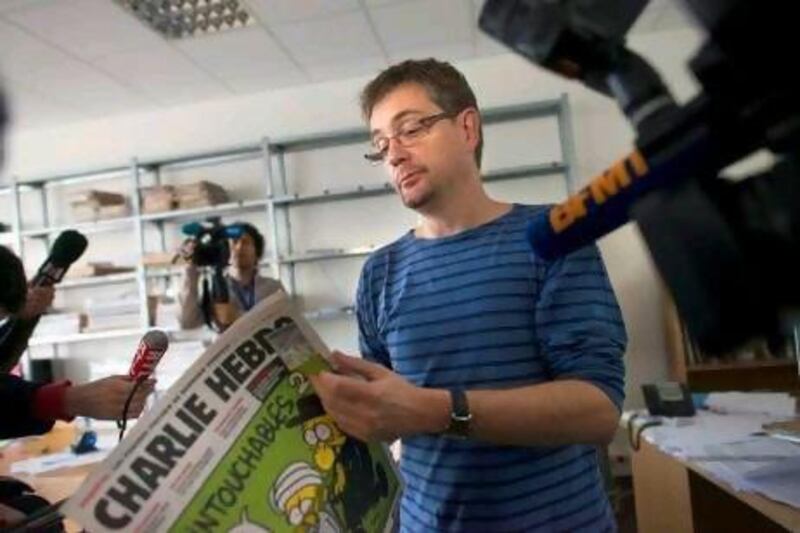LONDON // France yesterday ordered heightened security at its interests around the world as it braced itself for an angry response to new cartoons insulting the Prophet Mohammed.
French embassies and schools in 20 countries will be closed tomorrow and riot police have been sent to guard the Paris offices of the satirical weekly Charlie Hebdo.
The magazine, which thrives on pushing at the boundaries of decency, used a cartoon in yesterday's edition to link current controversies concerning the US-made, anti-Islam film Innocence of Muslims and the publication of paparazzi photographs of Kate Middleton, Britain's Duchess of Cambridge, relaxing topless on private property in the south of France.
Widespread protests about the tawdry film have been accompanied by violence in which at least 28 people, including the US ambassador to Libya, have been killed.
Charlie Hebdo has already been the target of an arson attack after offending Muslims in France. Its offices were firebombed last November after an edition in which the Prophet was depicted as its guest editor-in-chief.
In the latest affront, the magazine devoted yesterday's front cover to a cartoon parodying the hit film The Untouchables. A rabbi is shown pushing an imam in a wheelchair and both appear to be saying "mustn't mock".
In other cartoons, the tone degenerates into vulgarity, two purporting to show the Prophet unclothed.
Although the magazine defended its actions on the grounds of freedom of expression, some French officials clearly saw the publication of the crude caricatures as an irresponsible provocation, especially given the tensions aroused by the American film.
France's foreign ministry issued a travel warning advising French people in Muslim countries to act with "the greatest vigilance". They were also urged to avoid public gatherings and potentially sensitive locations representing the West or religion.
Laurent Fabius, the French foreign minister, said after a meeting of Francois Hollande's cabinet that while it was important to defend freedom of expression, Charlie Hebdo risked throwing "oil on the fire".
Mr Fabius appeared to invite aggrieved parties to bring legal action against the magazine, saying: "Freedom of expression can be limited by court decisions. If there is a case of overstepping, it's up to individuals or groups to bring it to the courts, which will say whether the law was respected."
"I have obviously issued instructions so that special security measures are taken in all the countries where this could pose a problem," Mr Fabius said.
Tomorrow's closure of embassies and lycées and other French-run schools in some Muslim countries is designed to lessen the risk of disturbances following Friday prayers.
France has Europe's largest Muslim population, estimated at between five and seven million, and its leaders joined government in calling for calm.
Dalil Boubakeur, rector of the Grand Mosque in Paris, said the magazine's conduct amounted to a "disgraceful and hateful, useless and stupid provocation" but added: "We are not like animals of Pavlov to react at each insult."
An umbrella group, the French Council for the Muslim Faith (CFCM), called on Muslims to rise above the provocation and express their indignation by legal, peaceful means.
The magazine's publication of the cartoons has already attracted criticism around the world. The Vatican's official daily newspaper, Osservatore Romano deplored it as adding "fuel on the fire" following the attack on the US consulate in Benghazi, Libya. In Cairo, Sunni Islam's highest authority, Al Azhar, also condemned Charlie Hebdo. Grand Imam Ahmed Al Tayyeb said all Muslims rejected the decision to print caricatures "offensive to Islam and its Prophet, the prophet of humanity".
Charlie Hebdo's track record suggests that it sees controversy as a means of boosting its small circulation.
In 2006, it was among western publications that reproduced cartoons offensive to Muslims that originally appeared in a Danish newspaper and led to an eruption of anger in several Islamic countries.
Other religious leaders have also been ridiculed - a so-called "Pope special" in 2008 was followed by an unsuccessful court action in which the magazine was accused of inciting hate - and coverage of the death of Diana, Princess of Wales, in a Paris car crash in 1997 was seen as deeply tasteless.
French public opinion was sharply divided yesterday. But Stephane Charbonnier, the magazine's editor, was unapologetic, saying the cartoons would shock 'those who want to be shocked".
He added: "I'm not asking strict Muslims to read Charlie Hebdo, just like I wouldn't go to a mosque to listen to speeches that go against everything I believe."
One of his cartoonists, who draws under the name of Tignous, said of his work: "It's just a drawing. It's not a provocation."
France was already preparing for possible disturbances on the streets of Paris this weekend, when an unauthorised demonstration against Innocence of Muslims is planned. A similar protest outside the US Embassy last weekend led to scores of arrests.
The French prime minister, Jean-Marc Ayrault, said police would not give clearance for the new demonstration. "There is no reason to allow a conflict that doesn't concern France to come into our country," he told French radio.
However, Mr Ayrault reflected government misgivings about Charlie Hebdo's conduct by saying that while freedom of expression in France was guaranteed, it should be exercised with responsibility and respect.
Abdallah Zekri, president of the Anti-Islamophobia Observatory, based in Paris, as saying said legal proceedings were being considered, though no decision been made.
He said: "People want to create trouble in France. Charlie Hebdo wants to make money on the backs of Muslims."
foreign.desk@thenational.ae
* With additional reporting by the Associated Press






